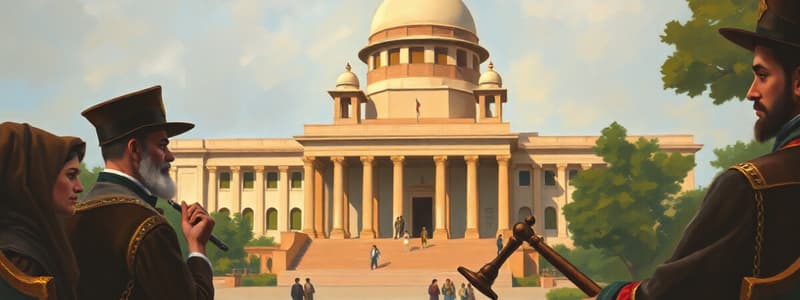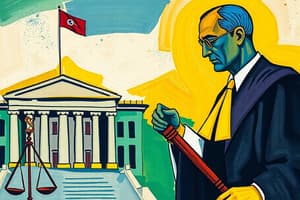Podcast
Questions and Answers
What is the primary role of the judiciary in a society?
What is the primary role of the judiciary in a society?
- To provide political guidance to the government
- To create laws that govern individuals
- To oversee the executive functions of the government
- To interpret laws and protect individual rights (correct)
Why is an independent judiciary considered essential in a democracy?
Why is an independent judiciary considered essential in a democracy?
- It solely resolves disputes between government bodies
- It encourages the majority's viewpoint over minority rights
- It ensures all individuals are subject to the same laws (correct)
- It allows the government to act freely without legal constraints
What does the term 'rule of law' imply?
What does the term 'rule of law' imply?
- Laws must favor the wealthy and powerful
- The government can bypass laws during emergencies
- All individuals are treated equally under the law (correct)
- Judicial decisions can be influenced by public opinion
What is one of the roles of the Indian Judiciary concerning the Constitution?
What is one of the roles of the Indian Judiciary concerning the Constitution?
How is the independence of the judiciary ensured?
How is the independence of the judiciary ensured?
What principle prevents the judiciary from being restrained by other government organs?
What principle prevents the judiciary from being restrained by other government organs?
In what way does the judiciary safeguard democracy?
In what way does the judiciary safeguard democracy?
What happens if the judiciary lacks independence?
What happens if the judiciary lacks independence?
What type of jurisdiction allows the Supreme Court to revisit legal issues and potentially reinterpret the law?
What type of jurisdiction allows the Supreme Court to revisit legal issues and potentially reinterpret the law?
In which situation can an individual directly approach the Supreme Court for remedy?
In which situation can an individual directly approach the Supreme Court for remedy?
What must the High Court do for a case to be eligible for appeal to the Supreme Court?
What must the High Court do for a case to be eligible for appeal to the Supreme Court?
Which jurisdiction allows the President of India to seek guidance from the Supreme Court on public importance matters?
Which jurisdiction allows the President of India to seek guidance from the Supreme Court on public importance matters?
What is the role of writs issued by the Supreme Court?
What is the role of writs issued by the Supreme Court?
When can a criminal case be appealed to the Supreme Court directly?
When can a criminal case be appealed to the Supreme Court directly?
Which of the following is true regarding the advisory powers of the Supreme Court?
Which of the following is true regarding the advisory powers of the Supreme Court?
What is the primary function of the Supreme Court's original jurisdiction?
What is the primary function of the Supreme Court's original jurisdiction?
What is one primary concern regarding judicial activism as mentioned?
What is one primary concern regarding judicial activism as mentioned?
In the context of the citizens' PIL, what is claimed as a priority by the slum residents?
In the context of the citizens' PIL, what is claimed as a priority by the slum residents?
Which of the following is NOT a matter typically handled by the judiciary?
Which of the following is NOT a matter typically handled by the judiciary?
What are the two ways the Supreme Court can remedy the violation of rights?
What are the two ways the Supreme Court can remedy the violation of rights?
What does judicial activism blur the line of distinction between?
What does judicial activism blur the line of distinction between?
Which of the following is part of the judiciary's role?
Which of the following is part of the judiciary's role?
What potential issue arises if the legislature and executive start engaging in judicial functions?
What potential issue arises if the legislature and executive start engaging in judicial functions?
What is the purpose of a Public Interest Litigation (PIL) in this context?
What is the purpose of a Public Interest Litigation (PIL) in this context?
What type of jurisdiction allows the Supreme Court to directly consider cases without them first going to lower courts?
What type of jurisdiction allows the Supreme Court to directly consider cases without them first going to lower courts?
Which of the following is NOT a type of writ that the Supreme Court can issue?
Which of the following is NOT a type of writ that the Supreme Court can issue?
What responsibility does the Supreme Court have in its advisory jurisdiction?
What responsibility does the Supreme Court have in its advisory jurisdiction?
In what situation does the Supreme Court hold original jurisdiction?
In what situation does the Supreme Court hold original jurisdiction?
What is one of the special powers of the Supreme Court of India?
What is one of the special powers of the Supreme Court of India?
Which of the following best describes the appellate jurisdiction of the Supreme Court?
Which of the following best describes the appellate jurisdiction of the Supreme Court?
What is a key feature of subordinate courts in the Indian judiciary?
What is a key feature of subordinate courts in the Indian judiciary?
What role does the Supreme Court fulfill in disputes among States?
What role does the Supreme Court fulfill in disputes among States?
What has contributed to the increased prestige of the judiciary in India?
What has contributed to the increased prestige of the judiciary in India?
What is one concern ordinary citizens have regarding the judiciary?
What is one concern ordinary citizens have regarding the judiciary?
Which statement accurately describes the judiciary in India?
Which statement accurately describes the judiciary in India?
What is one expectation that has arisen due to the judiciary's power?
What is one expectation that has arisen due to the judiciary's power?
Why do some acquittals in court generate public scrutiny?
Why do some acquittals in court generate public scrutiny?
What has been the impact of the tensions between the judiciary and other branches of government?
What has been the impact of the tensions between the judiciary and other branches of government?
Which of the following is NOT an expectation placed on the judiciary due to its increased power?
Which of the following is NOT an expectation placed on the judiciary due to its increased power?
What is a concern regarding how witnesses interact with the legal system?
What is a concern regarding how witnesses interact with the legal system?
Flashcards are hidden until you start studying
Study Notes
Why Do We Need an Independent Judiciary?
- Disputes in society are settled by an independent body which upholds the rule of law.
- This means that all individuals, regardless of social status, are subject to the same laws.
- The judiciary protects the rule of law, ensuring the supremacy of the law, safeguarding individual rights, resolving disputes, and preventing the democratic system from becoming a dictatorship.
- To fulfill these roles, the judiciary must be independent of political pressure.
Jurisdiction of the Supreme Court
-
The Supreme Court of India is one of the most powerful courts globally, yet its functions are defined by the Constitution.
-
The Supreme Court's power is outlined in three primary areas:
Original Jurisdiction
- Deals with cases involving disputes between the Union and the States, as well as disputes among the States.
- This power ensures the Supreme Court serves as an umpire in federal matters.
- The Supreme Court has the sole authority to handle these cases.
Writ Jurisdiction
- Individuals whose fundamental rights are violated can directly approach the Supreme Court for a remedy.
- The Supreme Court can issue writs, which are special orders, to enforce these rights.
- The High Courts also have the power to issue writs, but individuals can choose to petition either the High Court or the Supreme Court.
Appellate Jurisdiction
- The Supreme Court is the highest court of appeal.
- Individuals can appeal decisions made by the High Court to the Supreme Court, if certified by the High Court as involving a serious matter of law or constitutional interpretation.
- The Supreme Court also has the authority to review criminal cases where the lower court has imposed a death sentence.
Advisory Jurisdiction
- The Supreme Court can advise the President on matters of public importance or constitutional interpretation, providing advice to the executive.
- The President is not obliged to accept this advice.
Judiciary And Rights
- The judiciary is responsible for protecting individual rights.
- The Supreme Court can remedy violations of rights through two methods:
- Issuing writs (Habeas Corpus, mandamus, etc.).
- High Courts also possess this writ-issuing power.
- The Constitution grants these powers to the Supreme Court (Article 32) and High Courts (Article 226).
Relationship Between the Judiciary and the Parliament of India
- The judiciary has gained significant prestige over the years due to its role in upholding the rule of law and protecting individual rights.
- However, this role has led to greater expectations from the judiciary.
- There is ongoing debate about the scope of judicial power, with some arguing that judicial activism has blurred the lines between the executive, legislature, and judiciary, creating a delicate balance within the democratic system.
Studying That Suits You
Use AI to generate personalized quizzes and flashcards to suit your learning preferences.




